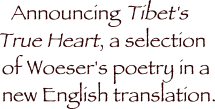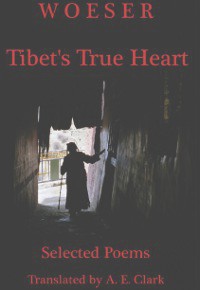2005-2008: Nothing left but a windblown flame
The Tibetan festivals:
Whose holidays are they, really?
I don’t know, I don’t know. I don’t know.
I can’t tell if anyone is happy on these holidays.
From the first month to the twelfth of the Tibetan calendar
(Not the secular, or the Chinese lunar calendar):
Losar, Saka Dawa, Shoton, Ganden Ngam Cho…
Originally they were for honoring the Buddha, pleasing the deities, driving out demons, and having fun.
The festivals are receding from us.
Nothing left of them but a name,
Nothing left but an empty show,
Nothing left but a series of official documents
Pounded into us, from head to tail it’s all PROHIBITED, PROHIBITED, and PROHIBITED!
Do thus−and−so, and such−and−such will be the consequence,
All pointing to a dreadful end.
For instance, if you were to visit a temple and spin the prayer−wheels…
If it’s not too bad, they dock your pay;
If it’s serious, you're fired;
If it’s more serious, get set for prison.
In time the official documents would dwindle;
They turned to oral transmission.
It’s an old rule, time−honored,
But still chilling.
Yet the scariest part hasn’t come to light,
Though the day before yesterday it showed its grim face.
Day before yesterday was Ganden Ngam Cho,
Memorial day for Je Rinpoche,
Each household lights butter lamps and recites the Three Jewels
— Or so it was, once.
Each year’s been worse than the one before. When ’05 came,
At a roar from newly−arrived Secretary Zhang, Lhasa would tremble and shake. (1)
Heedless of the ban, Bopa (2) gathered from all directions.
I watched flames soar into the sky
And light the masked faces.
This phantasmagorical consolation
Was enough: one could ignore the cops and plainclothesmen standing near.
In ’06, on the front page of the Lhasa Evening News,
The municipal Party Committee issued a formal warning
In the name of the city government: “It is prohibited for anyone … anywhere …
To participate in or become a spectator at the activities of the lamp−lighting holiday.”
In ’07, when I was far away in Beijing, I heard from friends:
“There’ve never been so many police,
Yet there have never been so many of the faithful:
In the throngs there are quite a few from Amdo and Kham prostrating themselves.
Only at the moment of prostration can you safely cry out.”
As for this year’s Ganden Ngam Cho,
Which occurred the day before yesterday,
They say,
“Went to the Barkor this afternoon.
A slew of shops had closed early.
But you could hear loudspeakers blaring over and over, in Tibetan and Chinese,
TO TAKE PART IS PROHIBITED.
TO BE A SPECTATOR IS PROHIBITED.
TO GATHER A CROWD IS PROHIBITED.
Don’t know where the loudspeakers had been installed,
But you could hear them by the Tsuklakhang,(3)
The sound traveled that far, so far…
Just like in the Cultural Revolution, the old folks whispered.
Every day the loudspeakers, in Tibetan and Chinese … it strikes dread.
And there are so many men on the rooftops, pacing back and forth,
Armed and unarmed,
And quite a few patrolling the old town,
Some in uniform, some not…
It feels like there are amchoks (4) everywhere,
Mis (5) everywhere.”
When the photos from Xinhua appeared online,
They showed no sang (6) rising from a full censer,
Nor were there any Lhasa people wearing big masks,
And the folk from Amdo and Kham who’d come in former years to worship,
There were none, there were none. There were none.
There were only kushos (7) from the Tsuklakhang
Lighting butter lamps, and the flames flickered in the wind.
The night sky a deep, deep blue; the Potala was still, and oddly desolate.
The figures dotting the big square, except those on duty,
Were they not all flacks and zangpiao (8), moved by curiosity?
When the report from Xinhua appeared online,
It quoted a riot policeman holding a shield:
“The common people can light lamps to their hearts’ content,
We won’t let the bad guys start trouble burning!” (9)
And he went on, didactically,
“Tonight they all want to light a peace lamp,
According to Tibetan ethnic tradition.”
No. It’s not a ‘peace lamp.’
It’s a memorial lamp.
Have you people never, ever, had the slightest clue?
Have you never, ever, heard the voice hidden in our hearts?
“In a world corrupt, the common folk
Pine for the Great Master
Who pitied the earth and grieved for the Land of Snow.
I wait, now, I miss your kindness,
For only the venerable one abides with us.” (10)
Only the venerable one abides with us!
Notes by the Poet
(1) From the heroic words of the oilman Wang Jinxi, who was known as ‘Iron Man’ in the Mao Zedong era: “At a roar from the oilman, even the earth trembles and shakes”.
(2) Bopa, Tibetan for ‘Tibetans.’
(3) Tsuklakhang, the Tibetan name for the Jokhang Temple complex.
(4) amchok, Tibetan for ‘ear’, figurative for a plainclothesman or a spy.
(5) mi, Tibetan for ‘eye’, figurative for a plainclothesman or a spy.
(6) sang, Tibetan for incense used in Buddhist devotions.
(7) kusho, Tibetan for Sir or Master, here designates a monk.
(8) zangpiao, an abbreviated name for young people working in the arts who have come from Han regions to live in Lhasa.
(9) From a line of old Chinese poetry: “Only provincial officials are allowed to start fires; the common people are not allowed even to light a lamp.” (Lu You, a poet of the Song Dynasty)
(10) From the poem "Cherishing the Memory of Tsongkhapa the Founder."
Translator’s Notes
Losar, Saka Dawa… Losar is the Tibetan New Year’s Festival, which for astronomical reasons usually falls within a day of the Chinese New Year, though it probably originated in Bön culture. The prayer festival of Monlam Chenmo occurs on the fourth day of Losar; Woeser does not mention it in her list, perhaps because to the practical mind Monlam Chenmo can be subsumed under Losar, which it immediately follows. Saka Dawa falls in the middle of the fourth month and honors the birthday of Buddha Sakyamuni. Shoton, at the end of the sixth month, is observed with various festivities in different locales: a gigantic thangka is unveiled on a hillside at Drepung, and Tibetan operas are performed in Lhasa. On the twenty−fifth day of the tenth month, Ganden Ngam Cho commemorates the death of Je Tsongkhapa, the fourteenth−century founder of the Gelug sect, of the Monlam Chenmo festival, and of Ganden Monastery. Its distinctive mark is the lighting of lamps and bonfires. In 2008 this feast fell on December 21, the “day before yesterday” in this poem.
and recites the Three Jewels. I believe Woeser is referring to the practice of ‘taking refuge’ in the Buddha, the sangha, and the dharma by means of a brief devotional formula.
Each year’s been worse than the one before. On her blog, Woeser appended to this poem a series of photographs taken in successive years at the Ganden Ngam Cho celebrations. Several lines in the poem appear to describe what is shown in the photos.
Secretary Zhang Zhang Qingli was appointed acting Party Secretary of the TAR in November 2005 and given full authority in May of the following year.
And light the masked faces These are not ceremonial masks such as figure in Cham dancing, but ordinary surgical masks, whose use in public to control the spread of infectious illness is common throughout the PRC, but which on occasions like this one provide anonymity.
A peace lamp The policeman’s phrase ping an deng sounds like a technical term, like the Chinese word for Christmas Eve, ping an ye. The expression translated “didactically” (sha you jieshi de) denotes a mistaken confidence in one's own knowledge.
The Great Master. Tsongkhapa. Woeser has substituted 宗师 zongshi for 祖师 zushi, adjusting the language of the anonymous contemporary poet in order to emphasize religious insight rather than ancestral authority.
the venerable one While this phrase might apply to the venerated Tsongkhapa, in modern usage it is the Chinese translation of “His Holiness,” a term of courtesy for the Dalai Lama.
the oilman Wang Jinxi The successful leader of the drilling teams at Daqing in the early 1960s, when the rift with the Soviets forced China to develop its own sources of energy. His prominence in edifying propaganda during that era is documented by Stefan Landsberger.
zangpiao This seems to be an abbreviation of a Chinese phrase for “one who drifts into Tibet.” Woeser indicates it does not describe the mass of migrant laborers but the more cultivated subset who are pursuing opportunities related to culture and the arts.
Only provincial officials are allowed to start fires The line from Lu You originally involved a pun on the surname of an overbearing official. In modern usage, the phrase 放火 “to start fires” can mean “to create a disturbance.” Although the nuances may defy translation, the foreign reader will note that considered in isolation, the statement attributed to the policeman is an effective bit of public relations, but considered in reference to its classical source, the allusion seems subversively ironic.


